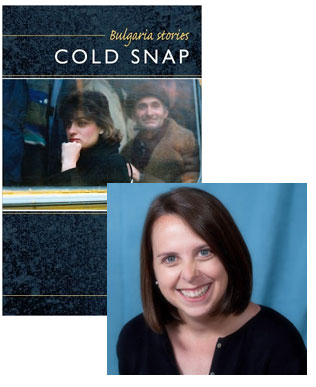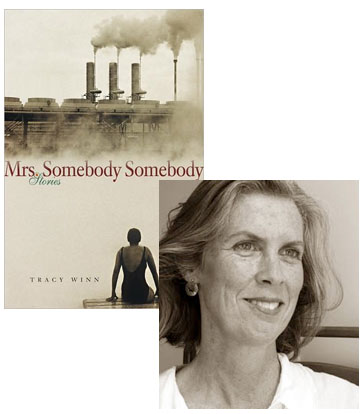Cynthia Morrison Phoel and the Weight of the Past

I haven’t read Cold Snap yet, but after Tracy Winn’s endorsement yesterday, I’m really looking forward to it. I’m sure it will be great, because when it comes to short stories, I can count on SMU Press to deliver the goods—or rather, I could count on them, since it increasingly looks as if the university will follow through on its plans to shut down the press. So Cynthia Morrison Phoel may be one of the last authors they publish for a long while, and that’s a shame. In her essay, Cynthia pays tribute to Katherine Shonk, who has been seen at Beatrice before; somehow, I missed the news of Shonk’s debut novel, Happy Now?, coming out last month, so I’m going to have to track that down, too…
My forthcoming book, Cold Snap: Bulgaria Stories, takes an insider’s look at life in a small Bulgarian mountain town. I served in the Peace Corps in such a town; when I started to think about Bulgaria through my fiction, I found myself wanting to not just visit, but to re-enter people’s houses, minds, and hearts. To spend some time in their tippy stilettos or sturdy handmade loafers.
In her exquisite collection, The Red Passport, Katherine Shonk masters this insider’s stance, revealing post-Communist Russia with keen sensitivity. Re-reading these stories for the second or third time, one of the things that impressed me most was not the squeeze and chafe of her characters’ shoes so much as the persistent weight of the past on their stories.
This is as it should be. As Eastern European societies have struggled to come to terms with new realities, one way to make sense of the present is to see it in relation to the past. Shonk has the wisdom to know that this relationship is not uniform—that the relative value of past and present varies by character.
20 May 2010 | selling shorts |
Tracy Winn: Cold Snap Endures

The title story in Tracy Winn‘s Mrs. Somebody Somebody is one of the most effective short stories I’ve read in the last year,a recollection of an ambiguous friendship between two women working in a factory in post-WWII Lowell where the prospect of unionization slowly builds momentum, headed towards a ruthless and inevitable climax before circling back to its original delicate ambiguities. The following stories continue to draw upon the Lowell setting, subtly forming connections to each other but never becoming a “novel in stories,” as they say these days. Random House is publishing the collection in trade paperback this summer, but I wanted to call your attention to the original hardcover release as an example of the excellence SMU Press brings to curating the modern American short story—but may not be able to continue bringing, as the university has somehow decided the press is a non-essential function and is preparing to shut it down (ostensibly not permanently, but one can imagine how difficult it will be to persuade them to flip that switch back if it goes).
Tracy pays tribute to another SMU Press author, Cynthia Morrison Phoel, who will also be putting in an appearance on Beatrice, and after reading this tribute, I can’t wait to see Phoel’s stories. I suspect you might feel the same way.
Cynthia Morrison Phoel has the heart of Charles Baxter, the polish of Alistair MacLeod, the timing of Lorrie Moore, Stuart Dybek’s eye for design, and a subtlety of style that is purely her own. She did her service in the Peace Corps in Bulgaria and Cold Snap is a collection of stories about the people of a fictional Bulgarian town called Old Mountain.
While the lives of her characters, with their Bulgarian particularities, quickly pulled me in, I found myself falling to the much deeper concern of what it means to be human anywhere. In fact, I went down like a candlepin the first time I read one of these stories, “I Guess That Counts For Something,” in a workshop. Seconds into it, I forgot that there was a writer conveying the character’s experience. Phoel presents the power of Neddy’s passion and her struggle without ever calling attention to herself. I’ve looked closely at her craft and it is like magic. Unlike the Wizard of Oz, Phoel stays hidden behind the curtain.
Sometimes, I can’t even find the curtain. I believe that results from the inevitability of her prose and the naturally solid framework that underlies it. Listen to her here, in “I Guess That Counts For Something,” where Neddy is paralyzed by the emptiness of her life:
“By the fourth day of the heat wave, Neddy has come to see it as more of a slow roasting. It is still early, and already sweat bastes her brow, traces her spine, and blanches her breasts and buttocks. The two black dresses she had made when Lubo died are not intended for this weather: constructed of sturdy polyester, they are designed more for endurance than comfort.”
Hear the music in “bastes her brow, traces her spine, and blanches her breasts and buttocks?” Very precise wording is one of the many strengths of Phoel’s art, but I would argue that it is Neddy’s music we hear, not Phoel’s. Neddy’s life, as signaled by her dresses, is “designed more for endurance than comfort.”
19 May 2010 | selling shorts |

 Our Endless and Proper Work is my new book with Belt Publishing about starting (and sticking to) a productive writing practice.
Our Endless and Proper Work is my new book with Belt Publishing about starting (and sticking to) a productive writing practice. 
